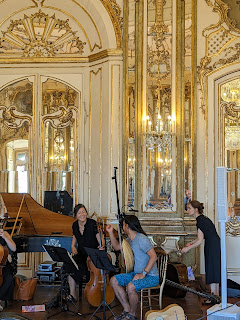Baroque Music in the Palace of Queluz
The Sintra Festival is an annual two week event that hosts diverse concerts, many in historic venues around Lisbon and nearby Sintra. There is poetry, large and small ensembles, even an all Rachmaninoff accordion (!) concert. I attended the opening concert featuring intriguing lesser-known baroque music from the early 18th C, performed by the Portuguese early music ensemble Ensemble Bonne Corde. The concert was held in the Throne Room of the National Palace at Queluz, northwest of Lisbon, and was entitled "Funchal in London: Concerti Grossi by António Pereira da Costa". The main focus of the concert was performances of three concerti grossi by da Costa (1697-1770), kapellmeister of the Cathedral of Funchal on the island of Madeira. Apparently these are the only known Portuguese concerti grossi, a musical form very popular in Italy in the early 18th century. A concerto grosso alternates solos or small ensembles with tutti sections involving the whole orchestra...think of Bach's Brandenburg concerti as a later example inspired by the Italian model. In this concerts, three concerti grossi of da Costa were contrasted with works of the same era by Italian composers. The only one of these familiar to me was Francesco Geminiani (the others were by Cervetto and Porpora). The music was all new to me, and matched the flamboyant baroque architecture of the room with its elaborate ornamentation and florid style.
The passion and scholarship of the group, eager to share the work of a relatively unknown Portuguese composer was admirable, but a little pruning would have helped audience appreciation, as would have more variety in programming. The audience was very appreciative of this fine performance. BTW, I loved walking around the palace and gardens, sort of a mini-Versailles. But Versailles has no cacti!


Comments
Post a Comment